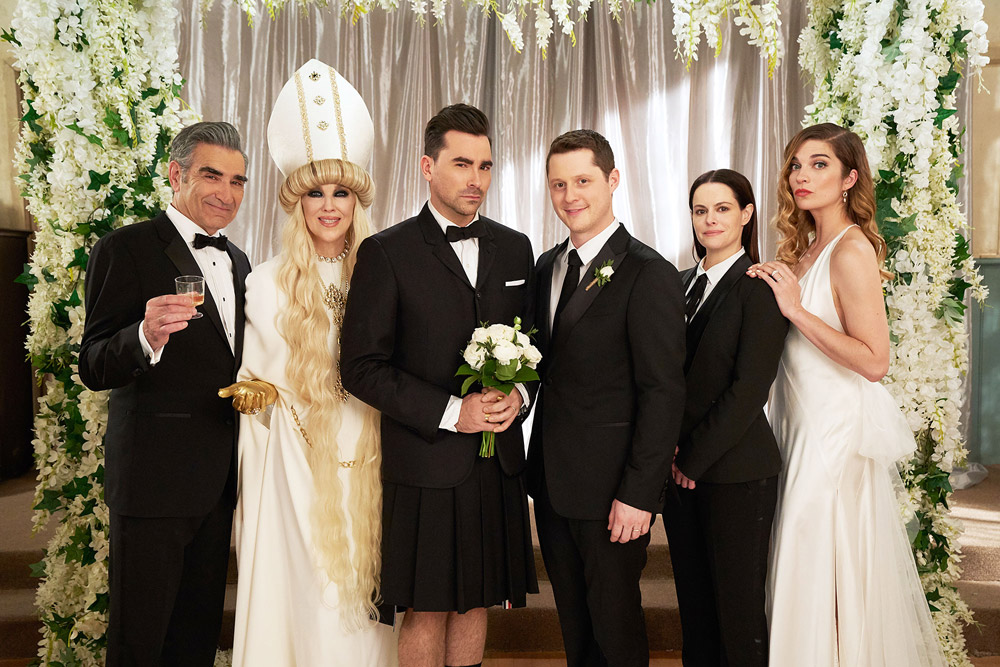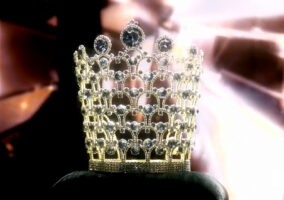
We will open in the parlance that is practically required whenever a beloved series ends: Yes, they stuck the landing. And yes, we did cry, even though we really didn’t want to.
Like a lot of people, our passionate love of Schitt’s Creek caught us by surprise and happened a bit after the show’s first season aired. We discovered it on Netflix, found it mildly amusing in its first season and then discovered somewhere near the end of the second or the start of the third that somewhere along the way, we had become addicted to watching the stories of the Rose family unfold, and how they became intertwined with the people of Schitt’s Creek. By the time Patrick sang “Simply the Best” to David on open mic night (without a doubt, the most romantic display of queer love ever captured, in any TV show or movie) we were not only deeply in love with these people, but had been turned into warm little puddles of sentimentality whenever we visited them. For a time, Schitt’s Creek felt like nothing else on television – and that may have been the most apparent evidence of its brilliance, because at the end of the day – and the series – it was clearly exactly like a lot of shows in the history of television: full of warmth, good cheer, gentle and loving people, and ending with affirmations of family, community, romantic love, and even financial well-being. Happy endings for everyone, in every sense of the word.
The series that opened with a visual joke of what looked like a man and woman engaging in anal sex with the placard “Don’t worry, it’s his sister!” plastered over it, ended with the visual joke of a brother and sister walking down the aisle together, looking for all the world like they were about to get married. It would be easy to assume that Schitt’s Creek, like so many shows, softened its edges when success and acclaim befell it – and to be fair, there is some truth to that. The first couple of seasons were far more biting, especially since the Rose family were not, individually, particularly nice people. But by the end of the second season, it was clear there was a long-term narrative plan in place that involved each member of the Rose family growing and evolving as they faced the challenges of living a life so unfamiliar to them, in a setting so unlike any they ever envisioned for themselves. In other words, what started out as a “rich folks living amongst the rubes” sitcom that may have owed a bit more to Green Acres than it would have liked to admit, quickly understood (under Dan Levy’s creative guidance) that it could become a deeply rewarding long-term character study. You can sort of sense the show coming to an understanding of what it could be when the people of Schitt’s Creek started becoming less reliant on the “quirky rural rubes” tropes and the main characters started to reveal themselves to be complicated people, each with their own demons to conquer. Johnny needed to address his sense of failure, Moira needed to work through a frank assessment of her abilities and expectations, Alexis needed to discover that she was at her greatest when she was on her own, and David needed to discover that someone like him could put aside their fears and neuroses and accept real love.
For us, the problem started about midway through the previous season. All truly successful shows have to come to terms with that sense of self-awareness when everyone involved realizes there are a lot of eyes on them and a good deal of those eyes are passionate about the work they’re doing. Schitt’s Creek never went up its own ass, the way so many successful shows do, but we’ll admit that we lost a little bit of interest when it became clear that everyone was going to Learn an Important Lesson, just as it was clear what each of those lessons were going to be. There was a point at which the sentimentality overruled the comedy, although it was never truly a problem because the cast is good enough and the writing smart enough to have kept the show fresh for the entire length of its run.
Even so, we went into the finale pretty much knowing exactly how it was going to play out; knowing that the show was going to do its damnedest to make us cry; knowing that the wedding scene would be a well-calibrated tear-jerker. And like we said, it worked. We cried. It was all brilliantly, beautifully done even if it offered no surprises. And it managed this because of the work of its two most important creative assets: Dan Levy’s writing and Catherine O’Hara’s genius-level comedic abilities. When Levy granted David Rose the alternate meaning of a happy ending, we couldn’t help but admire his ability to balance over-the-top weepy sentimentality with truly hilarious and biting social comedy. As for Catherine O’Hara, her final scene officiating her son’s wedding was some of her best comedic work in the whole length of the series – and she’s been consistently serving up a master class in every episode. Which isn’t to say Eugene Levy’s masterful skill at playing the straight man wasn’t a huge part of the show’s success, nor can Annie Murphy’s indelible and unforgettable work as Alexis ever be discounted. Moira and Alexis Rose have already become drag queen go-tos and there’s no doubt in our minds they will become classic drag impressions for years to come. We can think of no better compliment to pay their work.
But look, we tried. We really did. We brought every bit of critical cynicism we possibly could to this finale, knowing it would be cute and warm and gently funny in a rewarding way, ready to find some sort of reason to decry the show’s lack of teeth. But like David Rose’s face when Patrick Brewer first sang to him, we couldn’t hold up the facade and it crumbled in the face of such good humor, such great friends, and such bittersweet goodbyes to people we will truly miss.
And if Dan and Catherine don’t get Emmys out of this, then the Emmys mean nothing.
[Photo Credit: POP TV]
Yea or Nay: Coach x Richard Bernstein “Barbra Streisand” Turnlock Shoulder Bag Next Post:
First Look: Netflix’s New Comedy Series “Space Force” Premieres May 29, 2020
Please review our Community Guidelines before posting a comment. Thank you!



